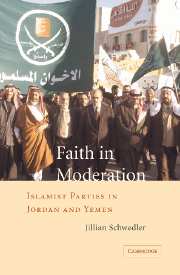Book contents
- Frontmatter
- Contents
- List of Figures
- List of Tables
- Preface
- Acknowledgments
- List of Abbreviations
- Note on Transliterations and Translations
- Faith in Moderation
- 1 Moderation and the Dynamics of Political Change
- 2 Political Liberalization as a Mechanism of Control
- 3 Public Political Space
- 4 Cultural Dimensions of Political Contestation
- 5 Justification and Moderation
- 6 Conclusion: Does Inclusion Lead to Moderation?
- References
- Index
6 - Conclusion: Does Inclusion Lead to Moderation?
Published online by Cambridge University Press: 18 December 2009
- Frontmatter
- Contents
- List of Figures
- List of Tables
- Preface
- Acknowledgments
- List of Abbreviations
- Note on Transliterations and Translations
- Faith in Moderation
- 1 Moderation and the Dynamics of Political Change
- 2 Political Liberalization as a Mechanism of Control
- 3 Public Political Space
- 4 Cultural Dimensions of Political Contestation
- 5 Justification and Moderation
- 6 Conclusion: Does Inclusion Lead to Moderation?
- References
- Index
Summary
In this study, I have examined the inclusion-moderation hypothesis – the idea that political actors included in pluralist processes become more moderate as a result of that inclusion – through a structured comparative study of two Islamist groups and find that the IAF in Jordan has become more moderate over time, while the Islah party in Yemen has not. The evidence from party documents, internal party debates, interviews, and evolving party practices suggests that the ideology of the IAF has indeed evolved from a relatively closed worldview to one that is more pluralist and tolerant of alternative perspectives. I do not claim that the IAF or Muslim Brotherhood are fully committed to liberal democratic norms and practices, but I do argue that the party has become ideologically more moderate – in the sense of being relatively more open and tolerant of alternative perspectives – than it had been prior to the 1989 political opening. In Yemen, the Islah party has not changed in a similar manner. In this chapter, I highlight several insights on democratization and moderation that emerged from this comparative study and then briefly review the three factors that explain the variation between the IAF and the Islah party. Finally, I situate these two political parties within a larger context of Islamist politics in both countries.
One observation is that much of the literature on democratization in the Middle East adopts the teleological language of the transitions literature, so we tend to emphasize progress toward democracy and use the language of stalled or failed transitions.
- Type
- Chapter
- Information
- Faith in ModerationIslamist Parties in Jordan and Yemen, pp. 192 - 216Publisher: Cambridge University PressPrint publication year: 2006
- 1
- Cited by

